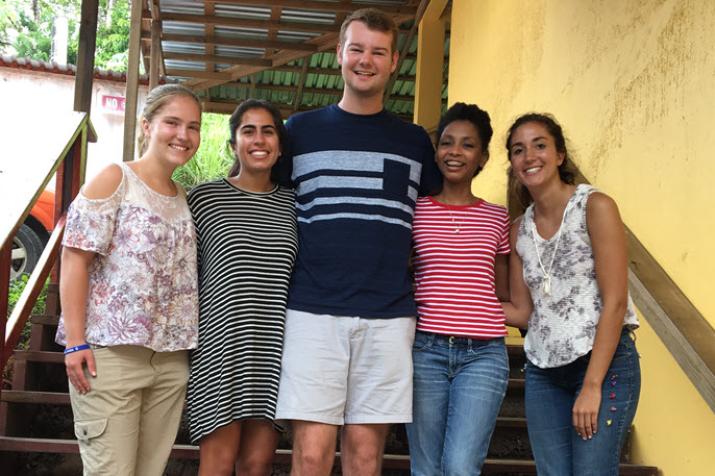
Our team (L to R): Lauren Hale ’19, Sujata Kishnani ‘19, Jesse Mangold ‘19, Dr. Stacy Zuniga (community outreach and medical director of Clínica Esperanza) and Rachel Katz ‘18.
Published August 14, 2017, last updated on April 7, 2020 under Voices of DGHI
Just over one week out from the field, I've had more time to reflect on my experiences in the breathtakingly beautiful Roatán, an island in the Caribbean Sea located approximately 40 miles off the northern coast of Honduras.
Through the DGHI Student Research Training (SRT) program and with mentorship from Dr. Dennis Clements, three other undergraduate teammates and I spent two months volunteering with our community partner Clínica Esperanza. The clinic, based in Sandy Bay in Roatán, provides high-quality healthcare services to all people at low cost and welcomes indigent patients regardless of their inability to pay.
Reaching 2,500+ Children
Our primary project this summer, facilitated by our ever-so-patient supervisor, Dr. Stacy Zuniga, was to provide free eye exams at local schools and distribute glasses as needed to the students. Additionally, we recorded each student’s height and weight and conducted a survey with questions about their family eye history and risk factors for developing myopia, or nearsightedness.
After two months, we were able to reach more than 2,500 students in 20 schools, covering a large majority of the island. The vast majority of students had never received an eye exam before, so every day it was extremely rewarding to be able to witness the look of instantaneous joy and relief when a child with 20/100 vision puts on glasses for the first time to see a sharp 20/20 with ease.
Also, on a related personal note, I am proud to say that I have the entirety of the Snellen eye chart memorized cold.

My teammates and me with some of the students at a school in Coxen Hole.
Screening for Glaucoma
Our secondary project involved screening adult patients at the clinic each morning over the age of 30 for glaucoma using a Tonopen to measure intraocular pressure (IOP). Each participant completed our survey with questions about his or her eye history and risk factors for developing glaucoma. When the IOP reading fell above the normal range, we referred the patient to an optometrist, Dr. Alex Reichmann, who visits the clinic each Thursday.
On a few lucky Thursdays we had the opportunity to take turns shadowing Dr. Alex while the others were coding survey data. It was gratifying to see patients we referred to him a few weeks earlier show up for a consult and witness our work come full circle.
As it often happens during fieldwork, around our sixth week, after screening exactly 100 patients, our Tonopen would no longer calibrate! Our original schedule meant arriving to the clinic at 8:00 a.m. to do the glaucoma screenings , but we adapted by instead heading to the school for the day at that time.
"Esperanza" Means Hope
The lifeline of the economy in Roatán is the tourism industry: pristine beaches and coral reefs, world-famous diving spots and cruise ship ports. Yet, just a 15-minute drive away from the paradisiacal resorts in West Bay, I witnessed a shockingly stark contrast in scenery.

Cruise ship docking in Coxen Hole for the day.
La Colonia is a community of squatter families, mostly young immigrants from the mainland, built on the steep mountainsides of Roatán near Sandy Bay. It was a 20-minute hike to the top from our apartment. When I got to the top, I was out of breath from more than just exerting myself -- the living conditions are shocking. Child malnutrition and teenage pregnancy are ubiquitous; potable water and family planning are scarce.
Clínica Esperanza is the primary healthcare provider for this underserved community, and it lives up to the name esperanza: for many, it is also their primary provider of hope.

A sunset view overlooking part of La Colonia.
It is still hard for me to wrap my head around the reality that while a tourist may be on their third margarita at the beach, only a few miles away, some families in La Colonia go without running water for more than three days at a time. I came across this quote that resonated with me while reading on the plane ride home:
“If we are satisfied with the world as it is, there is no point of contact, because the world that is satisfying to us is the same world that is utterly devastating to them.”
– Juan Luis Segundo
All people should be afforded the right to the highest standards of health, and I am grateful to the DGHI SRT program and Clínica Esperanza for the opportunity to help deliver on that mandate this summer.


